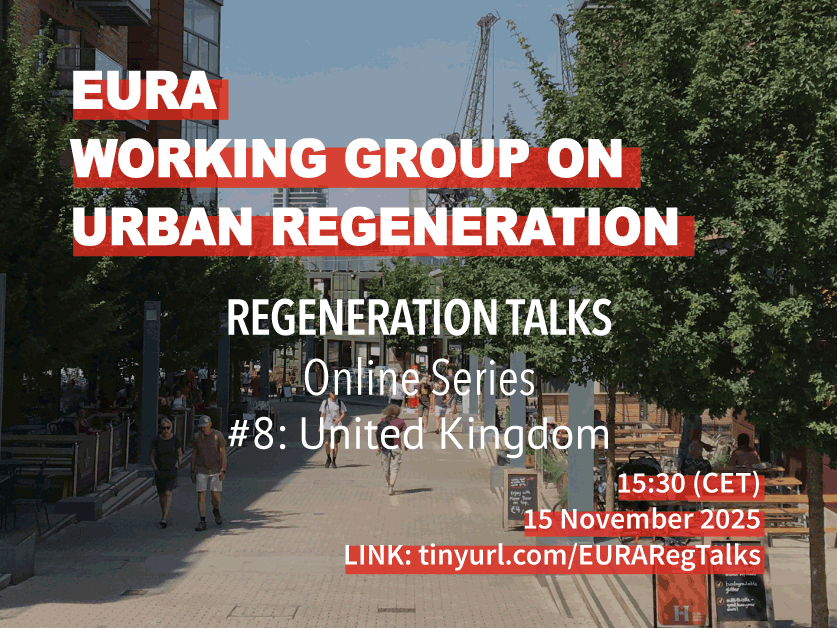
Urban Regeneration Talk #2, Spain – New date
19/01/2024
Urban Research & Practice – Volume 17, Issue 1
05/02/2024EURA WORKING GROUP ON
RECENTRALISATION IN COUNTRIES EXPERIENCING AN ‘ILLIBERAL TURN’
Call for membership – NOW CLOSED
Deadline:
31st March 2024
Organisers:
Björn Egner , Hubert Heinelt , Marta Lackowska, Iván Tosics
Please click the following button for the most updated information about the Working Group
Read moreOpen recentralisation is still a rare empirical phenomenon in contemporary Europe. Indeed, looking at the international comparisons of local autonomy and its changes in Europe, we observe a general trend of increasing local discretion. The Local Autonomy Index (LAI) indicates that the median value of local autonomy has increased constantly. Furthermore, the differences between the studied 39 countries tend to decrease.
Some countries stand out against this background. Poland – because the latest data encompassing the period 2015-2020 (which coincides with the beginning of the Law and Justice rule) indicate a sizeable deviation from decentralisation in Central and Eastern European countries. Hungary – because the downslide in the LAI value initiated in 2009 culminated in a record of a 18% decrease in the most recent measurement.
Looking closer at European countries, we may state that contemporary recentralization processes in Europe are motivated and justified by both pragmatic (counteracting the economic crisis) and ideological (‘illiberal turn’) arguments. The notion of ‘illiberal turn’ has gained much prominence over the last decade in political studies over Central Eastern Europe being often matched with another term of 'democratic backsliding'. Hungary is the country for which the concept of illiberal turn has been most widely used and at the same time – the most radical example of recentralization practices in Europe. However, elements of ideologically motivated recentralization are clearly visible also in Poland, Turkey and more recently in Israel.
The proposed EURA working group should focused on recentralization in these countries experiencing an ‘illiberal turn’. We see recentralization in these countries as an element in a struggle over power, and examine conflictual situations – those that challenge the core of democratic systems. The aim of the proposed working group is to systematically analyse the situation in these countries in order to identify patterns and stages of (a) recentralisation and (b) (re)actions by local government. (Re)actions by local government are of particular interest because they allow to outline perspectives to oppose an illiberal tern in general and recentralisation in particular.
The planned work will start from two typologies – one of recentralization policies, and one of local reactions to these policies. These typologies have been elaborated in a paper written by Aksztejn et al. which has been published in the Journal of Urban Affairs. Although there are no formal rules for this yet, EURA has in the past supported its members who participated in such working groups financially in terms of covering travel costs for meetings of the working groups.
Click for already existing working groups of EURA and EURA membership. Who is interested in joining us in establishing such a working group? A first meeting of the working group is planned in April 2024 either in Vienna or Darmstadt. Please contact us at hubert.heinelt@tu-darmstadt.de
Björn Egner, Hubert Heinelt, Marta Lackowska and Iván Tosics
Update
The current list of interested participants include:
Wirginia Aksztejn, Nufar Avni, Ulas Bayraktar, Andrew Cartwright, Björn Egner, Dobos Gábor, Hubert Heinelt, Joanna Krukowska, Marta Lackowska, Łukasz Mikuła, Eran Razin, Evrim Tan, Iván Tosics
The current list of interested participants include:
Wirginia Aksztejn, Nufar Avni, Balázs Brucker, Björn Egner, Dobos Gábor, Hubert Heinelt, László Kákai, Desislava Kalcheva, Marta Lackowska, Irena Ograjensek, Guldem Ozatagan, Ilona Pálné Kovács, Eran Razin, Evrim Tan, Iván Tosics, Ali Cenap Yologlu







